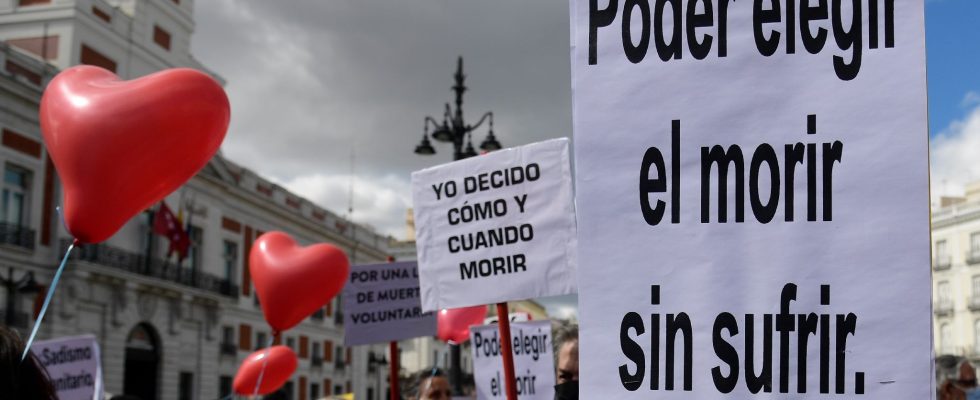It is too early to assess its impact. The law regulating euthanasia, which will soon celebrate its two years in Spain, continues to divide right and left. And this, while the number of people who have been able to end their day legally is slow to be published by the authorities.
Adopted in March 2021 by all the parties represented in the Cortes, with the exception of the Popular Party (PP, right) and Vox (extreme right), the reform, which entered into force on June 25 of the same year, has was validated on March 23 by the Constitutional Court. This had been seized in June 2021 by Vox and it still has to rule on another appeal, on the initiative, this one, of the PP.
In the second half of 2021, 173 requests for euthanasia had been registered and 75 of them executed, mostly by the family doctor. The difference between the two came from the fact that some candidates for euthanasia died of natural causes in the meantime, while others requested a postponement; still others withdrew their request.
Only 25 application files were refused, either by the doctors called upon to give their opinion upstream, or by the independent evaluation commission, made up of caregivers and lawyers, who must also issue a preventive opinion. A Spanish specificity that does not exist in the three other European countries that have legalized euthanasia, namely the Netherlands (in 2002), Belgium (also in 2002) and Luxembourg (in 2019). Another peculiarity of Spain: you have to be of legal age to be able to use it.
“The figures are very difficult to obtain”
It remains to be seen what may have happened in 2022 and during the first months of 2023. “The figures are very difficult to obtain”, deplores Javier Velasco, president of the association Right to die with dignity (DMD), which expected the government of socialist Pedro Sanchez to release the 2022 data in April, “but nothing happened”.
This opacity is explained by the electoral calendar which is not conducive to the publication of data on a controversial subject. A municipal and regional election is scheduled for May 28, followed by legislative elections in December. The opacity also comes from the administrative organization of the country. Since health is a prerogative of the autonomous communities, the statistics are slow to go back to the Ministry of Health, especially from the regions led by the PP, such as Andalusia, Galicia and Madrid, or Castile and León, in the hands of the PP and Vox.
“The first six months of application of the law show that it is in the right-wing autonomous communities that euthanasia is the least practiced”, denounces Javier Velasco, who is surprised that certain “minority forces with strong economic powers or religious” are relayed in a disproportionate way in the media to slow down the development of euthanasia, even though 86% of Spaniards say they are in favor of it.
Before the reform, DMD estimated that euthanasia could affect 1% of deaths in Spain. It could actually be much less, probably 1 in 1,000. Considering Belgian and Dutch practices, DMD estimates that 300 people could have been euthanized to date in the Iberian Peninsula. The regions that practice the most are those reputed to have the best health systems: Catalonia and the Basque Country, followed by Navarre, Cantabria and Asturias. A classification to put into perspective, if we relate the number of euthanasias to the population.
Euthanasia and organ donation
In 60% of cases, if we believe the statistics for the second half of 2021, people who wanted to shorten their lives suffered from neurodegenerative diseases such as Alzheimer’s or Parkinson’s. People with cancer or heart or respiratory disease accounted for 40% of cases. The exact opposite of what is observed in Belgium and the Netherlands.
Javier Velasco also points out that 22% of euthanasias in 2021 resulted in organ donation, which is not very surprising, since Spain is world champion in this practice, with 40 donors per million inhabitants. approximately.
“That’s very good, but the population should also be guaranteed universal and equitable access to palliative care,” explains Olga Prieto, spokesperson for the Spanish Society for Palliative Care (Secpal). “Palliative care and euthanasia are two different things that are neither complementary nor exclusive of each other. We made this clear to the French parliamentary delegation who came to meet us in March, as part of the debate underway in France on this subject”, she adds. A point of view shared by the PP and the Catholic Church. In Spain, it is estimated that 80,000 people die each year, without having had access to the palliative care they would have needed.
